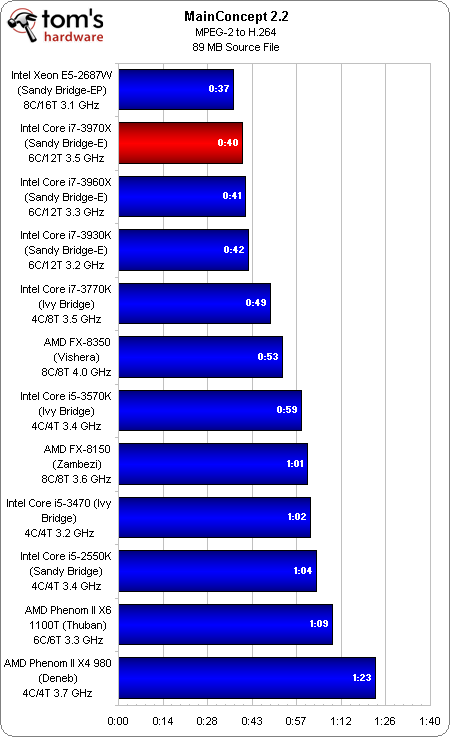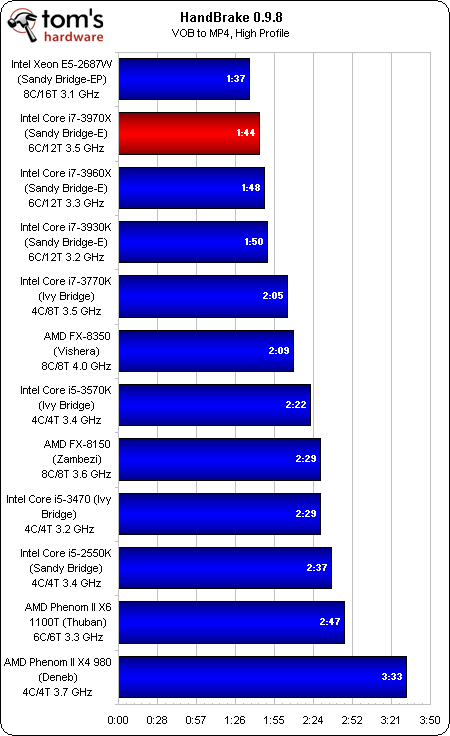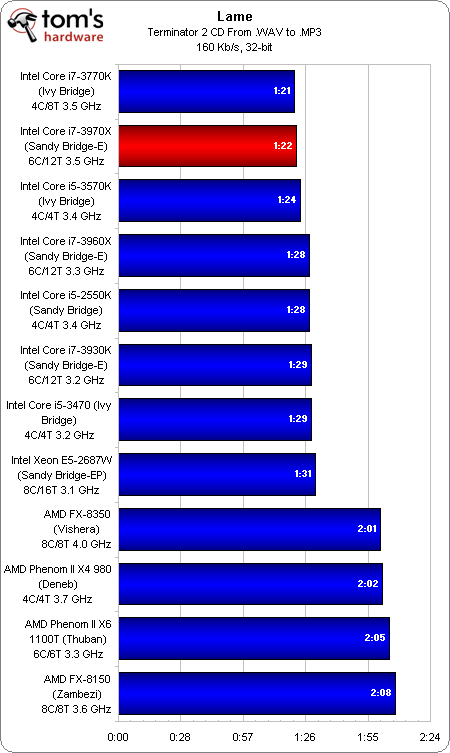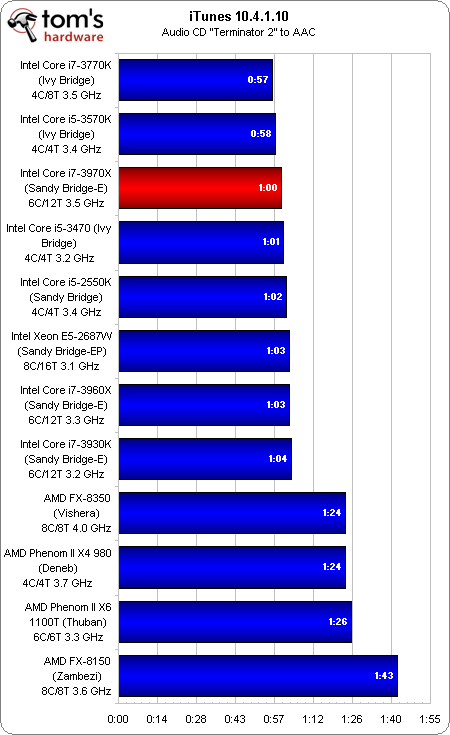Core i7-3970X Extreme Review: Can It Stomp An Eight-Core Xeon?
After one year of dominating the enthusiast space, Intel's Core i7-3960X is being replaced. The new Core i7-3970X features higher clock rates, but also imposes a 150 W TDP. Just for kicks, we're putting it up against another 150 W CPU: the Xeon E5-2687W.
Benchmark Results: Media Encoding
Our MainConcept benchmark isn’t as demanding as it once was; a majority of our test subjects finish the task in less than one minute. But we’re still able to see the application taxing the Xeon’s eight cores, putting it in first place. The fast six-core Core i7-3970X takes second, while the -3960X and -3930K follow, separated by one second each.
The same analysis applies to the latest version of HandBrake, which is similarly optimized for multi-core CPUs.
So much of our suite is heavily threaded. And while you can run multiple conversions in parallel to tackle multiple files simultaneously, our Lame benchmark taxes one core at a time.
Suddenly, Intel’s Ivy Bridge-based Core i7-3770K find itself in first place, accelerated by Turbo Boost technology. But because the Core i7-3970X also enjoys a frequency bump to 4 GHz in single-threaded tasks, it outperforms the Core i5-3570K for a second-place finish.
Most glaring is the divide between Intel’s slowest chip, the Xeon, and AMD’s fastest, based on its Bulldozer architecture.
On the other hand, converting a WAV file to AAC in iTunes is a single-threaded operation. Ivy Bridge’s per-clock advantage, coupled with aggressive Turbo Boost clock rates, land the Core i7-3770K and Core i5-3570K in first and second place.
But a maximum Turbo Boost setting of 4 GHz is good enough to get the Core i7-3970X into third, ahead of Intel’s Core i5-3470 processor.
Get Tom's Hardware's best news and in-depth reviews, straight to your inbox.
Current page: Benchmark Results: Media Encoding
Prev Page Benchmark Results: Compression Apps Next Page Benchmark Results: Battlefield 3-
amuffin 100mhz faster than the 3960X, not worth the extra premium.Reply
Same thing goes for the 3960X compared to the 3930K....not worth the extra 100mhz for $400.... -
tumetsu I've recently started facepalming every time I see BF3 in CPU benchmarks. "Boy oh boy, this hasn't been confirmed like a hundred times already but the single player is decidedly graphics-bound, so here, have these charts with identical results anyway."Reply -
dragonsqrrl jaquithBoo on Intel for not enabling all 8-cores especially at that price!They don't have much of a choice when it comes to the i7's. With the 32nm Sandy Bridge-E Intel has to make a choice between prioritizing clocks or core count within a 150W TDP, based on the target workload for a particular processor. For Xeon's the choice is easy, more cores. For desktop applications the choice isn't as clear, but I think most users would still benefit more from a higher clocked 6-core than a lower claocked 8-core. That's slowly changing though.Reply
Intel also doesn't want a situation where their LGA 1155 processors outperform their $1000 extreme edition in lightly threaded workloads, which is yet another reason to favor 6-core for now.
I'd personally like to see an 8-core i7, even if it means lower clocks, but I don't think that'll happen until Ivy Bridge-E. At 22nm Intel probably won't have to make a choice, we'll get the best of both worlds. -
nebun jaquithBoo on Intel for not enabling all 8-cores especially at that price!why would they....they don't need to do it at this time....amd's top cpu is still very slow when compared with even intels mid rannge cpusReply -
unknown9122 Why do people still benchmark on itunes 10.4? 10.7 is out... as for the 8 cores as said above^, there is no need to have more than 6. Because if it had 8, then xeons would not sell to pros.Reply -
BoredErica Why are we not manually overclocking this expensive CPU? Why do we do benchmarks against stock ig 2500k?Reply -
A Bad Day You also forgot something when comparing against Xeon:Reply
Stability test.
Run the i7 for one month under Prime95. It will crash. Run the Xeon for one month under Prime95. If it crashes, then you got a defective Xeon because they're not suppose to crash under 24/7 workload. -
anthonyorr nebunwhy would they....they don't need to do it at this time....amd's top cpu is still very slow when compared with even intels mid rannge cpusReply
Why would you even include the 8350? It is 1/6th the price of this CPU. I couldn't imagine what a modern AMD desktop CPU would consist of at the $1000+ price range.




